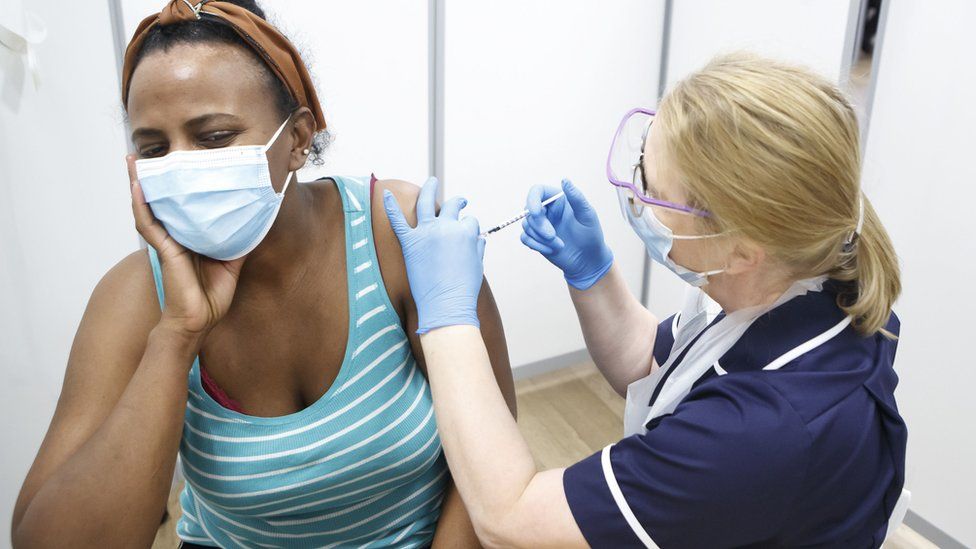Covid: 12-week vaccine gap defended by UK medical chiefs
- Published

The UK's chief medical officers have defended the Covid vaccination plan, after criticism from a doctors' union.
The UK will give both parts of the Oxford and Pfizer vaccines 12 weeks apart, having initially planned to leave 21 days between the Pfizer jabs.
The British Medical Association said cancelling patients booked in for their second doses was "grossly unfair".
But the chief medical officers said getting more people vaccinated with the first jab "is much more preferable".
The Pfizer-BioNTech vaccine was the first jab approved in the UK, and 944,539 people have had their first jab.
The first person to get the jab on 8 December, Margaret Keenan, has already had her second jab.
Pfizer has said it has tested the vaccine's efficacy only when the two vaccines were given up to 21 days apart.
But the chief medical officers said the "great majority" of initial protection came from the first jab.
"The second vaccine dose is likely to be very important for duration of protection, and at an appropriate dose interval may further increase vaccine efficacy," they said.
"In the short term, the additional increase of vaccine efficacy from the second dose is likely to be modest; the great majority of the initial protection from clinical disease is after the first dose of vaccine."
It comes as:
- The UK has seen a surge in the number of daily cases, with a record 55,892 reported on Thursday
- A fireworks and light display to welcome 2021 has taken place over London, but revellers were not able to ring in the New Year in the usual way because of the coronavirus pandemic
- The leaders of eight London boroughs are urging the government to delay the reopening of primary schools, saying it's unfair they are resuming classes when boroughs with lower infection rates are not
- Ministers say they want to see schools open at the earliest opportunity
The decision to delay the second dose has, understandably, caused concern.
There is some evidence regulators say - at least for the Oxford vaccine - that it will actually boost immunity.
But for those who are due to get a second dose soon it will undoubtedly be upsetting that they now have to wait.
But the move is about practicalities. The UK is in the middle of a public health crisis and despite the fact that millions of doses are pre-ordered, there is concern the supply of the vaccine will not be as smooth as everyone would ideally want.
There is a global demand for these vaccines and there are bound to be times when supply does not meet demand.
So the logic of the move is that by spreading this thin resource the most widely, it will have the greatest benefit - not only to the vulnerable but to everyone.
Lives have been put on hold and livelihoods lost.
This is the quickest way back to some degree of normality.
Even if it does leave some of the vaccinated susceptible to infection, it should in theory at least protect them from serious illness.
Given where we are now, the argument is that that is a price worth paying.
As well as approving the Oxford-AstraZeneca vaccine on Wednesday - the second approved for use in the UK - regulators also said that doctors could wait longer between the two courses.
This means more people will get the first jab sooner, even if they have to wait longer for their second jab.
Experts advising the government, including the Joint Committee on Vaccination and Immunisation (JCVI), said the focus should be on giving at-risk people the first dose of whichever vaccine they receive.
Defending the move, the UK's four chief medical officers - including England's Prof Chris Whitty - said in a statement released on New Year's Eve: "In terms of protecting priority groups, a model where we can vaccinate twice the number of people in the next two to three months is obviously much more preferable."
They said they recognised that rescheduling second appointments was "operationally very difficult" and would "distress patients who were looking forward to being fully immunised".
However, they said that for every 1,000 patients booked in for a second dose, which will "gain marginally on protection from severe disease", that would mean 1,000 more people missing out on "substantial initial protection".
The chief medics said that, while one million people had already been vaccinated, approximately 30 million UK patients and health and social care workers eligible in the first phase "remain totally unprotected and many are distressed or anxious about the wait for their turn".
They added that the JCVI was "confident" 12 weeks was a reasonable interval between doses "to achieve good longer-term protection".
"We have to follow public health principles and act at speed if we are to beat this pandemic which is running rampant in our communities, and we believe the public will understand and thank us for this decisive action."
Earlier, the BMA's Dr Richard Vautrey said GPs were unhappy they were being asked to cancel appointments that had already been made for second doses.
He said the BMA would support practices who honour the existing appointments for the follow-up vaccination, calling for the government to do the same.
- Published31 December 2020
- Published30 December 2020